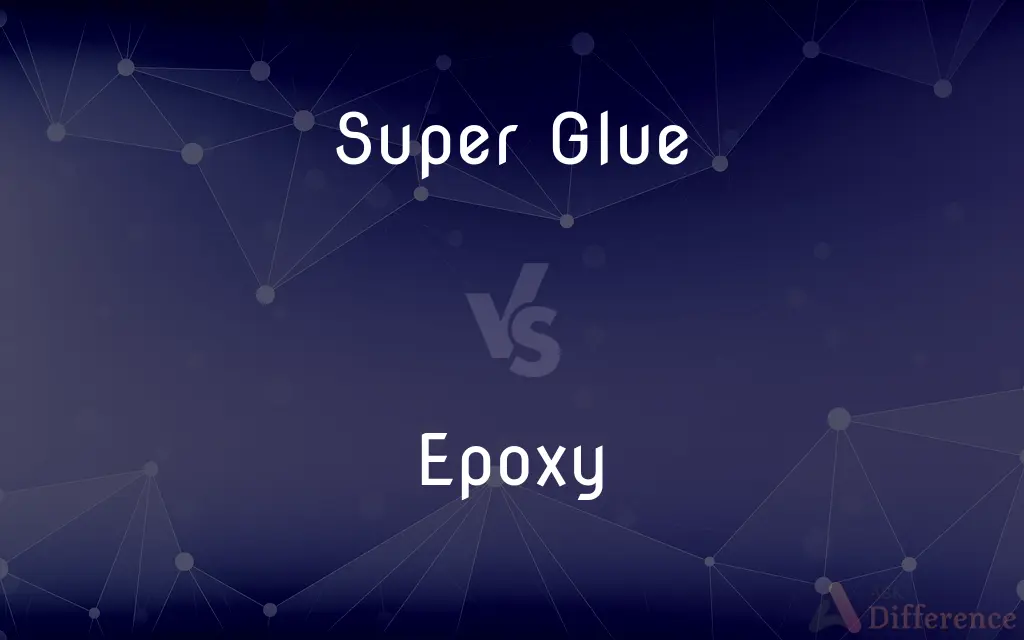Super Glue vs. Epoxy — What's the Difference?
By Maham Liaqat & Fiza Rafique — Published on December 3, 2024
Super Glue is a cyanoacrylate adhesive known for its quick bonding time and strength on small-scale applications, whereas Epoxy is a two-component system offering high strength and durability for a wider range of materials and larger projects.

Difference Between Super Glue and Epoxy
Table of Contents
ADVERTISEMENT
Key Differences
Super Glue, a cyanoacrylate adhesive, is celebrated for its rapid bonding ability, setting in seconds, making it ideal for quick repairs of small items. Epoxy, on the other hand, requires mixing a resin and hardener, offering a longer work time and forming stronger bonds after curing, suitable for heavier-duty tasks.
Super Glue excels in bonding similar materials, especially plastics and metals, while its effectiveness diminishes on porous surfaces. Epoxy’s versatility shines through its ability to adhere to a diverse range of materials, including wood, metal, glass, and some plastics, providing a more reliable bond on both porous and non-porous surfaces.
The strength of Super Glue is significant for its size, effectively holding tight in tensile situations. However, Epoxy outmatches it in terms of overall strength, including shear and impact resistance, making it the go-to for structural repairs and filling gaps.
Epoxy's setting time ranges from minutes to hours, allowing for adjustments during the application process. This contrasts with Super Glue’s nearly instantaneous setting, which leaves little room for error or repositioning once parts are joined.
The durability of Epoxy against environmental factors such as heat, chemicals, and water is superior to that of Super Glue, making it more suitable for outdoor applications or in areas exposed to harsh conditions.
ADVERTISEMENT
Comparison Chart
Composition
Cyanoacrylate
Resin and hardener
Setting Time
Seconds
Minutes to hours
Suitable Materials
Plastics, metals (best with non-porous)
Wide range, including porous surfaces
Strength
High in tensile strength
High in tensile, shear, and impact strength
Durability
Less resistant to heat and chemicals
Highly resistant to heat, chemicals, and water
Compare with Definitions
Super Glue
Not suitable for high-stress areas.
Super Glue may not hold the handle of a heavily used tool.
Epoxy
A two-component adhesive for strong bonds.
Epoxy is used to bond the components of a broken statue.
Super Glue
A fast-acting adhesive for quick repairs.
Super Glue can instantly fix a broken ceramic mug handle.
Epoxy
Effective on a variety of materials.
Epoxy can secure a wooden table leg to its metal bracket.
Super Glue
Limited gap-filling capability.
Super Glue cannot fill the gap in a broken pottery piece.
Epoxy
Resistant to environmental factors.
Epoxy coatings protect outdoor furniture from moisture and UV damage.
Super Glue
Ideal for small-scale applications.
A drop of Super Glue can reattach a loose eyeglass arm.
Epoxy
Excellent for filling gaps.
Epoxy can fill and repair a crack in a concrete floor.
Super Glue
Vulnerable to high temperatures.
Super Glue bonds may weaken in hot environments.
Epoxy
Requires curing time.
The epoxy on the repaired vase needs to cure overnight.
Epoxy
Any of various usually thermosetting resins capable of forming tight cross-linked polymer structures characterized by toughness, strong adhesion, and low shrinkage, used especially in surface coatings and adhesives.
Epoxy
A thermosetting polyepoxide resin used chiefly in strong adhesives, coatings and laminates; epoxy resin.
Epoxy
A thermosetting resin; used chiefly in strong adhesives and coatings and laminates
Epoxy
Glue with epoxy;
Epoxy the shards
Common Curiosities
Can Super Glue be used on wood?
Yes, but it is less effective than epoxy on porous surfaces like wood.
What is Super Glue best used for?
Quick repairs and bonding small, non-porous items.
How long does Super Glue take to set?
It sets in seconds, but full strength is achieved in 24 hours.
What is Epoxy best used for?
Heavy-duty bonding, gap filling, and applications requiring high strength and durability.
Is Epoxy waterproof?
Yes, once fully cured, most epoxies are waterproof.
Is Super Glue resistant to heat?
It has low resistance to heat compared to epoxy.
Can Epoxy bonds be broken?
Yes, but it requires significant force or heat.
Can I paint over Epoxy?
Yes, once cured, it can be sanded and painted.
How do I prepare surfaces for Epoxy?
Clean and slightly roughen surfaces for better adhesion.
How long does Epoxy take to cure?
Cure times vary but typically range from several minutes to hours.
Can Super Glue be used outdoors?
It's not recommended due to its lower resistance to environmental factors.
Is Super Glue toxic?
It can release vapors that irritate eyes and skin; use in well-ventilated areas.
Does Epoxy work on metals?
Yes, it is very effective on metals.
Is Epoxy or Super Glue stronger?
Epoxy is generally stronger, especially for shear and impact resistance.
How do I remove Super Glue?
Acetone or nail polish remover can dissolve it.
Share Your Discovery

Previous Comparison
True Syncytium vs. Functional Syncytium
Next Comparison
To Me vs. For MeAuthor Spotlight
Written by
Maham LiaqatCo-written by
Fiza RafiqueFiza Rafique is a skilled content writer at AskDifference.com, where she meticulously refines and enhances written pieces. Drawing from her vast editorial expertise, Fiza ensures clarity, accuracy, and precision in every article. Passionate about language, she continually seeks to elevate the quality of content for readers worldwide.













































